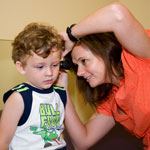Flu season is coming up fast. As the weather starts to get cooler, the number of flu cases starts to rise every year without fail. Waves of illness often hit schools at various times in the year because of poor prevention practices and large student populations.
Good health practices such as these prevention tips can help children and adults avoid this potentially dangerous illness.
- Get your vaccination – Adults and children need vaccinations yearly to prevent most strains of the flu. The vaccine is simple to take and is available at our office now. Remember that it takes two weeks for the shot to be effective.
- Wash your hands – Hand washing successfully prevents the spread of germs. Carry hand sanitizer and wash hands after sneezing, coughing, or activities where human contact is likely (e.g. shaking hands, playing games).
- Carry tissues – Covering your mouth with a tissue and blowing your nose regularly can help. Teach young children how to use tissues to prevent the spread of the virus. In absence of a tissue, sneezing or coughing into the crook of an elbow can prevent germs from spreading.
- Avoid touching your face – Children and adults sometimes have a hard time with this. It’s easy to rub your nose or eyes without thinking about it, but doing so could be increasing your risk of contracting an illness. Teach children to wash their hands before touching their faces to reduce the risk.
- Practice preventive health habits – Everything we do on a daily basis affects the likelihood of contracting illness. Proper sleep, diet, and exercise all strengthen the immune system to fight off common illnesses such as the cold and flu. Encourage children to drink water instead of sugary drinks and to eat enough fruits and vegetables.
- Sometimes staying home is best – Although children learn quickly to fake being sick in hopes of staying home, a fever or other signs of illness may warrant a sick day. Keep the flu from circulating in germ-breeding grounds such as schools by keeping sick children home.
Very young children are capable of learning positive health habits to reduce the risk of flu. At the age of 2 or 3, children can learn to wash their hands and to use only their own cups, plates, and utensils. Parents should try to set a good example in the home and use repetitive teaching opportunities to encourage childhood retention of good hygiene and prevention practices.
To get the latest updates on flu vaccines at Pediatric Associates of Franklin, click here or call our office at 615-790-3200 to schedule your child’s vaccine now.
The information and content on our website should not be used as a substitute for medical treatment or advice from your doctor.




